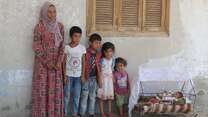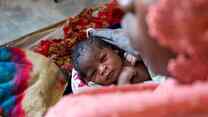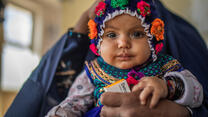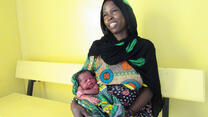
All smiles, Domo holds her eight-month-old baby in her arms. Yet less than a year ago, Domo had given up hope of ever having a child.
Her story goes back many years to when she was still living in her native village of Tilloa, a village on the border with Mali, approximately 90 km from the town of Ouallam. Since 2018, Domo Issoufou, aged 35, has been residing with her family on the Ouallam site created for internallly displaced people (IDP). She is one of thousands of people living on this site, all having fled their localities due to the terrible violence that has devastated the communes of Banibangou, Tondikiwindi, and Ouallam.
"When we were in Tilloa, there was no health center, and for a simple birth, we didn't think it was necessary to go to the Ouallam health center. We all gave birth at home. However, after delivering my first three children, my subsequent three newborns died shortly after birth. I never understood why I was giving birth to lifeless children; it was a very distressing situation.
The child I hold in my hands, Ichaou, is the survivor of three pregnancies that went wrong. It's a blessing from God that this child has survived, and it's thanks to the efforts of the midwives. Like the previous three, Ichaou also entered the world without any sign of life, but the midwives used a syringe in his stomach and placed him in an incubator. It was then that he finally let out his first cry. According to the midwives, there's a lot of heat in my belly (infection of amniotic acid), which doesn't make it easy for newborns to survive."
Despite the challenges of previous deliveries, Domo Issoufou is now savoring the joy of holding a baby in her arms. "And all this because, for the first time, I agreed to give birth in a maternity hospital, thanks to the advice of a matron trained by the IRC to come to the aid of the women living on this site", Domo says.
If things have gone well for Domo, it is in part thanks to Zara Hamidou, a matron trained by the IRC thanks to funding allocated by the European Union to support conflict-affected communities, particularly women and children, in the health, nutrition and protection sectors.
"It was Zara Hamidou who accompanied me to the maternity ward. I met her when I was 3 months pregnant. In fact, she had just returned from training with the IRC to work as a matron. She brought together the women of the site to explain to us the importance of giving birth in a maternity hospital, prenatal consultations, and exclusive breastfeeding from birth until the child is six months old. She then asked us to get in touch with her, as she is willing to follow pregnant women through to delivery. Zara's advice really changed our lives. It's thanks to her advice that my child has survived, he's in great shape and I'm so happy to have this little jewel after so much suffering.”
This advice has had a real impact on the lives of dozens of people living in the Ouallam IDP site.
Mother of eight children, Zara Hamidou, is also an internally displaced person (IDP) living on the IDP site since 2019 with her husband. Originally from the department of Banibangou, she comes from the village of N'Gaba located around 200 km from the town of Ouallam.
"We are 12 women chosen by the IRC to work at this IDP site. We were first trained before taking on the job of matron. I've had to accompany several pregnant women, some of whom gave birth very successfully, but others had complications and had to be transferred from the Ouallam health center in Niamey to major hospitals, including the national hospital, where they received the necessary care. One of them even gave birth to twins! I was also lucky enough to follow Domo Issoufou, a woman who suffered enormously after her first three deliveries before giving birth again. If we were able to give life-saving advice, it was thanks to the support of the IRC, which gave us the resources we needed to respond accordingly".
The village of Tilloa is one of several in the department of Banibangou to have experienced unprecedented violence by non-state armed groups, creating desolation and terror in the area of Banibangou, on the border with Mali, and Ouallam.
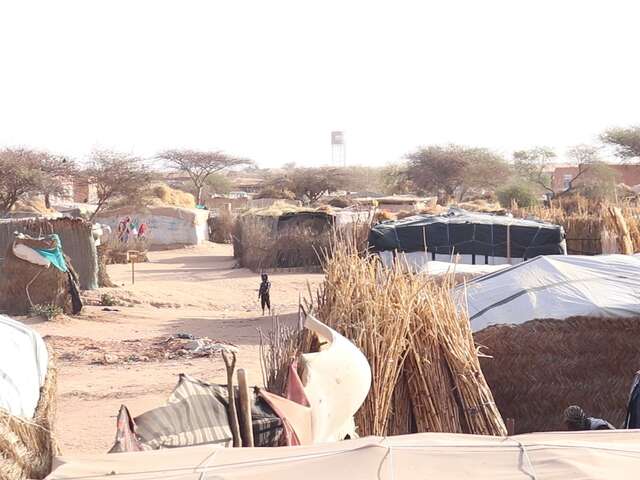
For several years, the EU Civil Protection and Humanitarian Aid has been providing support to communities affected by conflict in several regions of Niger and beyond in the Sahel.
This funding aims to respond to acute humanitarian needs in the Tillaberi region in the fields of health, nutrition and protection.
The International Rescue Committee partners with the European Union to provide life-saving support to people caught in conflict and disasters around the world. Our work funded by the EU enables people to survive, recover and rebuild their lives.

